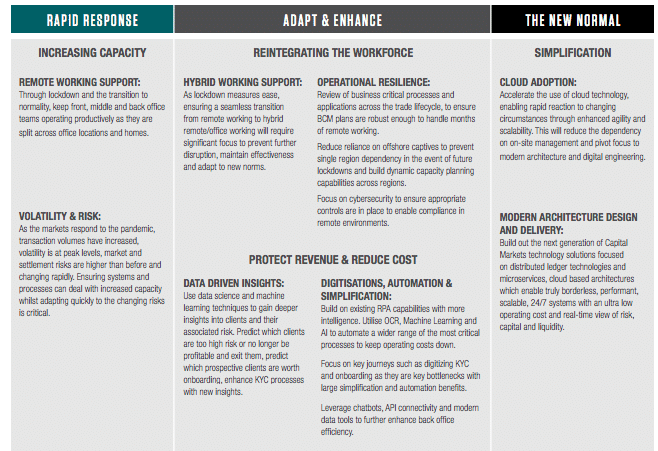
Remote working is likely to become a permanent feature of the ‘new normal’ after the Covid-19 pandemic and firms will invest in greater automation and becoming more data driven.
Consultancy Capco said in report, COVID-19, Risk Management Challenges, Short-Term Volatility and Illiquidity – What Next for Capital Markets?, that firms have weathered the initial COVID-19 storm.
“With the vast majority of the industry initiating remote working or split rotas for front office staff, the ‘plumbing’ of the financial system continues to operate unimpeded – and indeed, has managed major volume spikes without high profile disruptions or outages,” added Capco. “It also seems few challenges have arisen from a cybersecurity or risk perspective, although time will obviously tell.”
However remote working has also highlighted operating model inefficiencies and where manual processes are required to support certain products.
As a result Capco expects firms to accelerate their digital transformations using technologies such as cloud, machine learning and distributed ledger in the ‘new normal’ that will follow the passing of the pandemic.
“This will include projects to enhance digital channels and deepen end-to-end automation, as well as leverage data-driven concepts,” added Capco. “Cost reduction-related transformation will be a key theme. Remote working will be further ingrained within operating models.”
As remote working becomes a permanent feature across all enterprises, the consultancy said roles within the workforce will need to be re-evaluated and real estate footprints may need to reduce.
“We will see an acceleration in the use of cloud technology to allow faster responses to changing circumstances via enhanced agility and scalability,” added the report. “This will reduce firms’ dependency regarding ‘on-premises’ infrastructure (and its management), allowing them to pivot their focus and resources to modern architectures and digital engineering.”
There may also be less offshoring and some operations will be bought back to home territories to bolster contingencies.
Murray Longton, principal consultant at Capco, said in a statement: “Consolidation, enhanced digitisation and enhancements to risk management will all be key features of the transformation ahead. This is the moment to reassess and reimagine operating models through new technology and new ways of working, tapping into the cost and risk benefits offered by automation, digital enablement, data insights and next-level operational resilience.”
Surveillance technology
Remote working has also presented a challenge for trade surveillance systems, especially as the pandemic caused increases in volatility.
Greenwich Associates said in a report, Protecting Market Integrity During High-Risk Conditions, that volatility in March this year created abnormal trading patterns that, in many cases, were marked as red flags by surveillance and compliance systems Trade surveillance alert volumes surged more than 600% from January levels for many global market participants, according to data collected by Nasdaq said the consultancy.
Danielle Tierney, senior analyst for Greenwich Associates market structure and technology, said in a statement: “The good news is that investments in trade surveillance and compliance systems over the past decade helped trading desks navigate both the historic spike of market volatility in March 2020 in the face of additional unprecedented challenges, such as shifting the vast majority of staff to working at home.”
Tierney continued that early conclusions are cautiously optimistic about the performance of both market surveillance systems and the overall stability of the financial market infrastructure during the crisis.
However, she also warned that some regulatory and reputational risks may take time to appear.
“In particular, concern over reputational risk is likely to be an even more prominent factor, should inquiries and speculation into potential market abuse occur as the pandemic subsides,” added Tierney.








